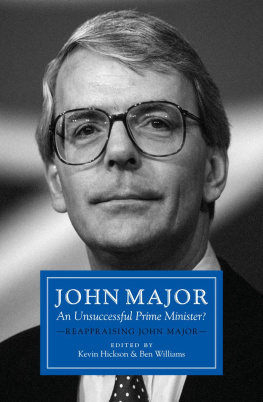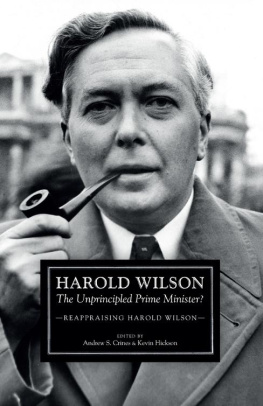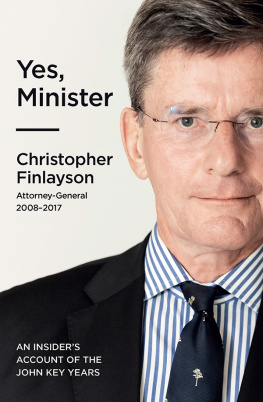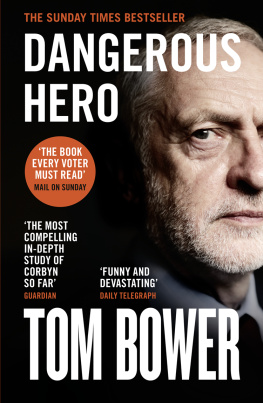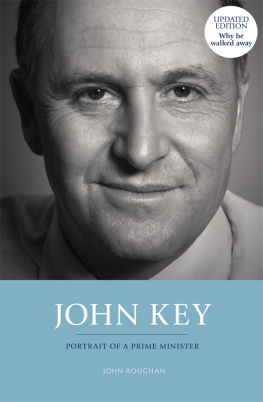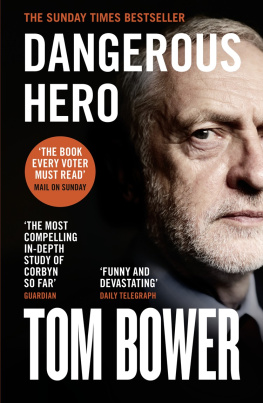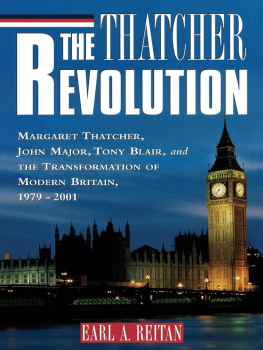Paul Anderson was editor of Tribune (199193) and deputy editor of the New Statesman (199396). He was co-author of Safety First: The Making of New Labour (1997, with Nyta Mann) and is currently a lecturer in journalism at the University of Essex.
Lord (Paddy) Ashdown was the founding Leader of the Liberal Democrats between 1988 and 1999 and the international communities High Representative and European Union Special Representative to Bosnia and Herzegovina between 2002 and 2006. He is now a Liberal Democrat peer. His autobiography, A Fortunate Life, appeared in 2010 and he has also published two volumes of diaries and six other books.
Arthur Aughey is Emeritus Professor of Politics at Ulster University. He has published extensively on the Conservative Party, British national identity and the politics of Northern Ireland.
Charles Clarke was MP for Norwich South (19972010), during which time he held various Cabinet posts including Home Secretary. Since 2010 he has been Visiting Professor to the School of Political, Social and International Studies at the University of East Anglia.
MarkDavies holds a Masters degree in History from Cambridge University, and a Masters degree in Law from University College London. He specialises in twentieth-century British history, European Union law and British constitutional law.
David Denver is Emeritus Professor of Politics at the University of Lancaster and is widely recognised as one of the leading experts on electoral studies. He has written extensively on British elections.
Sonia Exley is Assistant Professor in the Department of Social Policy at the London School of Economics. She has written extensively on education policy in Britain.
Mark Garnett is Senior Lecturer in Politics at the University of Lancaster, and is widely recognised as a leading scholar of the Conservative Party having published numerous biographies and histories.
Cathy Gormley-Heenan is Professor of Politics and Pro-Vice Chancellor for Research and Impact at Ulster University.
Kevin Hickson is Senior Lecturer in Politics at the University of Liverpool, where he has taught since 2003. He specialises in British political ideologies and has published on the political thought of the Conservatives, Labour and the Liberals/Liberal Democrats.
Wyn Grant is Emeritus Professor of Politics at the University of Warwick. He has written extensively on economic policy, agricultural policy and pressure groups.
Kevin Jefferys was formerly Professor of Contemporary History at Plymouth University and has written major studies of post-war British politics, the Labour Party, electoral politics and sport policy.
ShaunMcDaid is Lecturer in Politics at the University of Huddersfield. His book, Template for Peace: Northern Ireland, 197275, was published in paperback in 2016.
Catherine McGlynn is Senior Lecturer in Politics at the University of Huddersfield, where she teaches and researches on conflict resolution and identity politics. She has published widely on the politics of Northern Ireland.
Lord (Philip) Norton is Professor of Government and Director of the Centre for Legislative Studies at the University of Hull and a Conservative peer. He is widely recognised as a leading authority on the British constitution, having published thirty-one books and many articles.
Peter Oborne is the former chief political commentator of the Daily Telegraph. He writes a weekly column for Middle East Eye and the Daily Mail. He has written a number of books, including The Triumph of the Political Class (2007) and The Rise of Political Lying (2005). He appears on BBC programmes Any Questions? and Question Time and often presents Week in Westminster. He was voted Columnist of the Year at the Press Awards in 2017.
Gillian Peele is an Emeritus Fellow of Lady Margaret Hall, Oxford. Her most recent publications are The Regulation of Standards in British Public Life (with David Hine) and David Cameron and Conservative Renewal (edited with John Francis).
Bruce Pilbeam is Senior Lecturer in Politics at London Metropolitan University. He is the author of Conservatism in Crisis (2003) as well as numerous journal articles and chapters in edited books.
John Redwood is Conservative MP for Wokingham, where he has sat since 1987, having previously been Head of the No. 10 Policy Unit. He served in John Majors Cabinet prior to his resignation and leadership challenge in 1995. He has published numerous books on various aspects of politics and public policy.
Anthony Seldon is Vice Chancellor of the University of Buckingham, having previously been Master of Wellington and Brighton Colleges. He has produced many books on British politics, including biographies of John Major, Tony Blair and David Cameron.
Andrew Taylor is Professor of Politics at the University of Sheffield. He has published widely on British politics. Currently he is completing a study, What About the Workers? (Manchester University Press), examining the Conservative Partys relations with the organised working class.
Tony Travers is a professor in the Department of Government at LSE and has published extensively on British local government and London politics.
Alwyn W. Turner is an author who has published extensively on British politics and popular culture. His books include Rejoice, Rejoice: Britain in the 1980s (2010) and A Classless Society: Britain in the 1990s (2013). He lectures at Chichester University.
Ben Williams is a politics tutor at the University of Salford. He completed his PhD at the University of Liverpool between 2009 and 2013 and has written for a range of books, magazines, blogs and journals covering British politics.
Christian Wolmar is a writer and broadcaster who is the author of more than a dozen books on transport policy and railways, including, most recently, Are Trams Socialist? Why Britain Has Never Had a Transport Policy (2016) and To the Edge of the World: The Story of the Trans-Siberian Railway (2013). Railways and the Raj: The Story of Indian Railways is due to be published in the autumn of 2017. www.christianwolmar.co.uk @christianwolmar
Peter Oborne
I NOW REGRET MY REPORTING of John Major in the 1990s. In partial mitigation I was a junior political reporter, and others were more twisted and biased than me. The press corps refused to give Mr Major a chance. We were out to destroy him and this we duly did when his Conservative Party was obliterated at the 1997 general election.
We collectively created a narrative which defined John Major as weak, sleazy, incompetent and out of his depth. We told a story of failure, and went on telling it. Towards the end it was almost impossible to get a story into any paper which was not framed in this way.
The leader of the pack was, at first, Alastair Campbell. Campbell later became press secretary for Tony Blair but he was political editor of the Daily Mirror, and one of Westminsters most powerful and charismatic journalists, when John Major became Prime Minister in 1990.
He refused to give John Major any of the respect to which a Prime Minister is entitled. On one occasion he called him the piece of lettuce who passes for a Prime Minister. He also called John Major simply a second-rate, shallow, lying little toad of a man.

